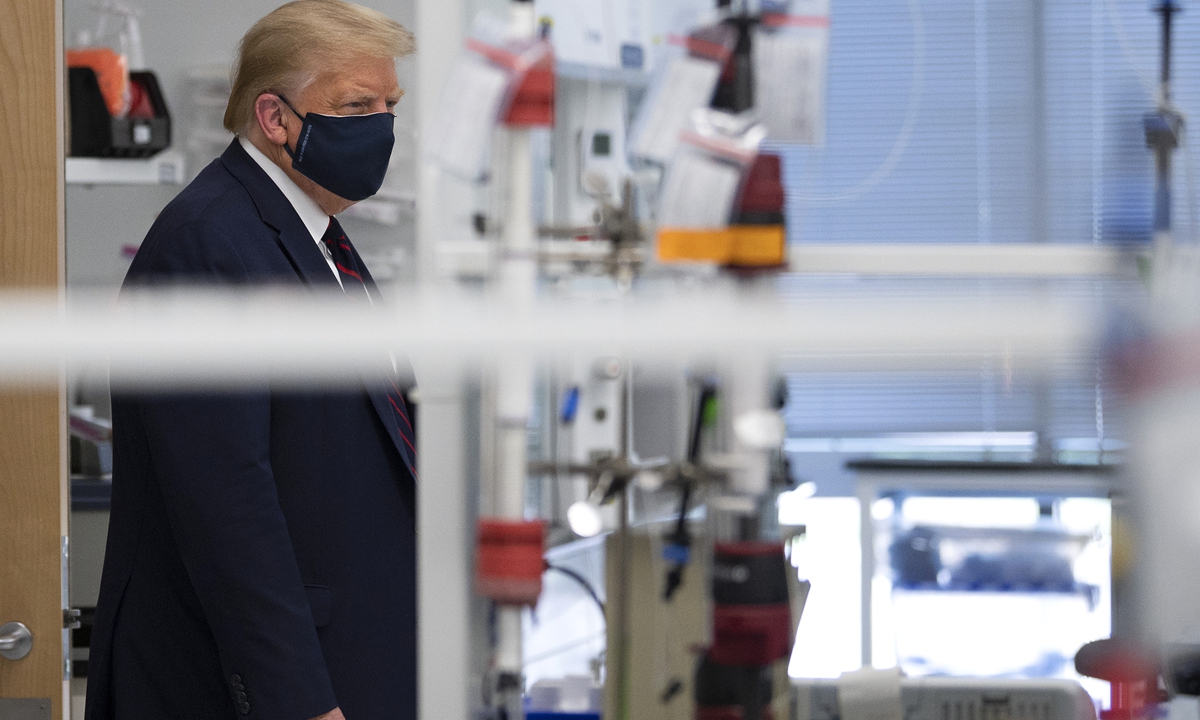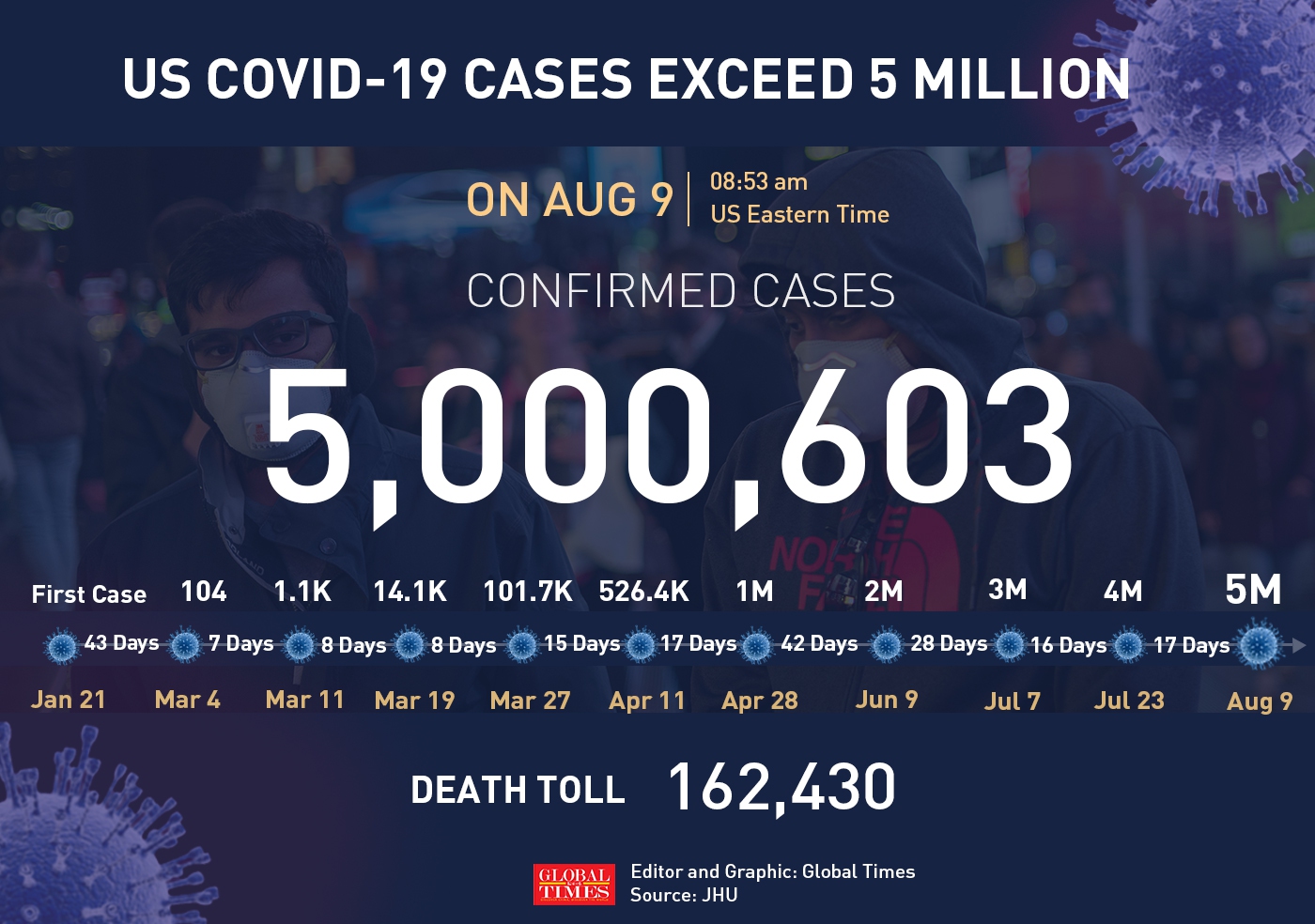US COVID-19 infections top 5 million
By GT staff reporters Source: Global Times Published: 2020/8/9 22:38:40
Epidemic may defeat Trump, pose problems for successor: expert

US President Donald Trump wears a mask as he tours a lab where they are making components for a potential vaccine at the Bioprocess Innovation Center at Fujifilm Diosynth Biotechnologies in Morrisville, North Carolina. Photo: AFP
As the US witnesses the grim milestone of confirmed COVID-19 infections surpassing 5 million and deaths hitting 160,000, experts said Sunday that the upcoming US presidential election appears dismal for President Donald Trump, and if he is defeated, his successor will face dealing with an ongoing crisis.
The cumulative number of confirmed infections in the US tops 5 million, which means that one in every 66 Americans is or has been infected with the novel coronavirus. More than 162,000 people have died of COVID-19 in the US, accounting for about 22.4 percent of total deaths attributed to the coronavirus in the world, Reuters reported on Sunday.
The Trump administration squandered almost every possible opportunity it got to curb the virus spread, and it has become the world's epicenter of the COVID-19 pandemic. The infections in the US are completely "out of control," Lü Xiang, a research fellow at the Chinese Academy of Social Sciences in Beijing, told the Global Times on Sunday.
At the beginning of the epidemic, the Trump administration slammed hard on Democrats over the loose epidemic control in the blue US states of Washington, California and New York. But after May, the worsened epidemic continued to threaten Republican states, including Texas. Traditionally a red state, it is now a swing state in the upcoming US presidential elections, Lü said. The last time Texas swung Democrat was in 1976 when Jimmy Carter won the state.
Except for the New York State where cases have plateaued, numbers of confirmed COVID-19 cases in other states and the US as a whole are still experiencing sharp rise, Lü said, noting that if there is a change in president, he will still be dealing with the epidemic in January when the country sees power shift.
"There is no easy way for the US to control the epidemic given the huge infection base, unless it imposes strict lockdowns, asks all residents to stay at home and quarantines patients in hospitals or makeshift hospitals as China did," Lü said.
In three months after the country registered its first victim, the number of confirmed cases surpassed 1 million on April 28. By June 9, 2 million people were diagnosed with the infections. Not a month later, confirmed cases hit 3 million in the US on July 7 and by July 23 hit 4 million, according to data from the Johns Hopkins University tracker.
The chance of Trump winning the upcoming presidential elections is "little to zero," Lü believes, saying his wanton attacks against China are one of his expressions of "desperation" over his grim chance of succession.
Polls are even showing that the public favor rival Joe Biden in the economy which is one of the most important pillars for the Trump team, according to Lü.
In the next three months, the US is likely to experience another wave of chaos, Lü predicted, as social conflict will extend beyond black and ethnic minorities and propel the majority poor who are suffering from economic setbacks and decreased governmental aid. This is another challenge for Trump, he said.
The US president extended unemployment benefits on Saturday through executive action but cut aid to $400 per week from what had been a $600 weekly benefit, which expired by end of July.
The US Labor Department reported Friday that domestic employment growth slowed considerably in July, underscoring the urgent need for additional government aid, according to Reuters on Sunday.
The US death toll from COVID-19 is expected to surpass 250,000 by December, according to new data from the Institute for Health Metrics and Evaluation (IHME) at the University of Washington's School of Medicine.
The projection by the IHME said if 95 percent citizens were to wear masks outdoors, the total number would decrease to 228,271 deaths, a drop of 49 percent, meaning more than 66,000 lives would be saved.
While the US sees new cases of about 60,000 people every day, Trump still has no intention of controlling the epidemic but is more inclined to wait till a vaccine comes out, experts said. Trump said it was possible the US would have a vaccine for the coronavirus by the time of the presidential election on November 3, but top American epidemiologist Anthony Fauci said that a vaccine that works and is safe will not be available until at least the end of the year, Reuters reported.
Trump's ratings in major national polls and key swing state polls are significantly behind his Democratic opponent Biden, and Trump has once again raised the possibility of postponing the presidential election, although experts say this is unlikely.
Li Haidong, a professor at the Institute of International Relations at the China Foreign Affairs University, said that the US has never postponed an election, not even when the US was mired in bigger crises, such as World War II and the Civil War.
The date of the presidential election is set according to the US Constitution. Trump has threatened to postpone the election solely because he feels under pressure and he wants to delay it for as long as possible to see if the situation will turn around, Li said.
Li anticipated that this year will see a lot more mail-in ballots than there used to be previously, because the pandemic will put people off from voting in person.

Graphics: GT
RELATED ARTICLES:
Posted in: SOCIETY